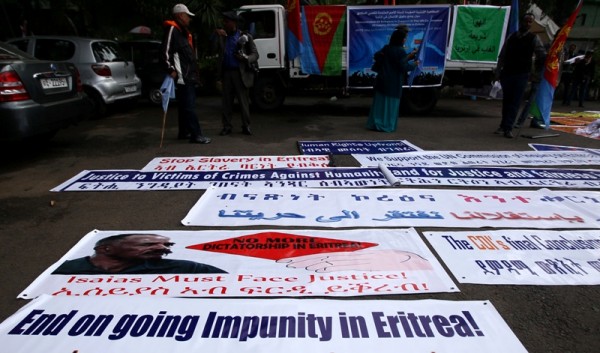Paris-based watchdog group Reporters Without Borders today announced that four journalists imprisoned in Eritrea have died in custody. IPI expressed deep sorrow over the news and called on the Eritrean government to release those journalists still in custody, many of whom have been imprisoned for over ten years.
Reporters Without Borders confirmed through sources that three journalists held since 2001, Dawit Habtemichael, Mattewos Habteab and Wedi Itay (Sahle Tsegazab) were found dead, on different dates, after spending over a decade in the northeastern prison camp of Eiraeiro.
The group further stated that “[a]nother journalist arrested in February 2009, whose identity has not been established with certainty, has also reportedly died in detention … in Abi Abeito military prison, near the capital Asmara.”
Reporters Without Borders also reported that Tesfalidet “Topo” Mebrahtu was “released on bond” earlier this year after being in detention for 10 months.
IPI Deputy Director Anthony Mills said: “IPI expresses its condolences to the families of the four journalists who appear to have died under abominable circumstances. We would like to remind the government of President Afwerki that we have not forgotten the other journalists in detention – who should be freed immediately.”
As the world was distracted in the wake of the 9/11 attacks on the United States in 2001, Eritrea jailed a number of journalists and opposition figures, including Habtemichael, Habteab and Itay. It was believed that between eight and 12 journalists were jailed at that time, according to IPI information.
Of those prisoners, several are believed to have died, including Fessehaye “Joshua” Yohanmes, Said Abdulkader of Admas, Medhanie Haile of Keste and Yusuf Mohamed Ali of Tsigenay.
Others reportedly remain in jail under harsh conditions and without charge or access to legal representation. Among them is Dawit Isaak, who also holds Swedish citizenship. Last year Isaak was awarded the Golden Pen of Freedom by the World Association of Newspapers and News Publishers, to highlight his continued incommunicado detention and the plight of his peers.
International pressure has been mounting for the release of the journalists. Last year, the European parliament issued a resolution on September 15 calling on Eritrea “to lift the ban on the country’s independent press and to immediately release the independent journalists and all others who have been jailed simply for exercising their right to freedom of expression.” They also urged the government “to provide any information about the prisoners’ situation, including the place of their detention and whether they are still alive.”

